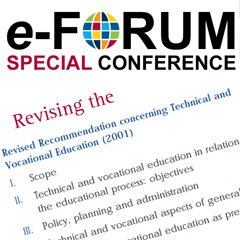
The UNESCO-UNEVOC International Centre: Who We Are | What We Do | Working With Us | Get in Touch
The UNEVOC Network: Learn About the Network | UNEVOC Network Directory
For Members: UNEVOC Centre Dashboard
Thematic Areas: Inclusion and Youth | Digital Transformation | Private Sector Engagement | SDGs and Greening TVET
Our Key Programmes & Projects: BILT: Bridging Innovation and Learning in TVET | Building TVET resilience | TVET Leadership Programme | WYSD: World Youth Skills Day
Past Activities: COVID-19 response | i-hubs project | TVET Global Forums | Virtual Conferences | YEM Knowledge Portal
Our Services & Resources: Publications | TVET Forum | TVET Country Profiles | TVETipedia Glossary | Innovative and Promising Practices | Toolkits for TVET Providers | Entrepreneurial Learning Guide
Events: Major TVET Events | UNEVOC Network News

Introduction | Resources | Messages | Participants | Sign Up
Sign up now! -->
UNEVOC e-Forum, 1 to 14 April 2014

This Special Virtual Conference is organized as part of UNESCO’s work on revising the 2001 Revised Recommendation concerning Technical and Vocational Education and seeks to consult diverse stakeholders involved in the development and implementation of TVET systems, policies and programmes. The contributions will feed directly into the broader consultation process that is currently taking place with UNESCO Member States.
This is a unique opportunity for everyone in the TVET community to share their vision and help shape the future of TVET and skills development.
Introduction
The Third International Congress on TVET called for profound transformations in the conceptualization, governance, funding and organization of technical and vocational education and training. During the Congress, a special session held on the normative instruments concerning TVET confirmed that the 2001 Revised Recommendation would benefit from revision and updating, to ensure a stronger focus on lifelong learning and to become responsive to challenges many countries currently face, such as rapid demographic and technological changes, youth unemployment, social inequalities, and sustainable development.
Monitoring the implementation of standard setting instruments in the field of TVET is part of UNESCO’s mandate and is one of the key areas of work outlined in UNESCO’s Strategy for TVET. The revised instrument can help to further advance the level of policy interest around the world and improve the quality and relevance of TVET for all. Evidence-based inputs and concrete ideas founded on practical experiences of TVET policies and programmes can strengthen the quality of the new version of the Revised Recommendation and increase its overall credibility and relevance.
As part of a rigorous process involving a number of high level consultations with UNESCO Member States over the next months, UNESCO-UNEVOC and the UNESCO TVET Section are jointly organizing this Special Virtual Conference from 1 to 14 April 2014 on the UNEVOC e-Forum. Interested members from the TVET community, including learners, employers, education providers, analysts and development experts are invited to participate and provide inputs to the revising process. This is a unique opportunity for everyone in the TVET community to make their voices heard and be part of a global consultation process on shaping the future of TVET.
Moderated by Professor Simon McGrath, Director of Research and Professor of International Education and Development at the University of Nottingham, this Special Virtual Conference will introduce the background and context of the normative instruments and will aim to gather inputs from participants on the following key questions:
We look forward to your active participation in the discussion from 1-14 April and we encourage you to circulate information on this event to your networks and encourage relevant colleagues to participate.
For more information on the wider consultation and drafting process, see here
Revising the 2001 Revised Recommendation concerning Technical and Vocational Education by Simon McGrath (April 2014, pdf)
Once you have signed up and the conference has started, you will receive an opening email by the moderator, Professor Simon McGrath. You can then reply to this message and will receive any contributions made by other conference participants. Note that all messages will be checked by UNESCO-UNEVOC before dissemination, so there may sometimes be delays, especially outside office hours (9am-5pm CET). For questions, please contact us at unevoc.e-forum(at)unesco.org
Please use the registration form to sign up for the conference. You will then be added to a conference mailing list and will receive all contributions via email. Note that if you do not wish to receive email notifications, you can also participate using the online interface by logging on with your UNEVOC account.
The main language of discussion will be English. However, you are invited to submit your contributions in any UN language: Arabic, Chinese, French, Russian or Spanish. They will be taken into consideration by the moderator and in the writing of the final synthesis report.